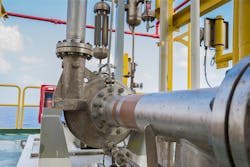There is the potential to expand the industrial pump market by more than $12 billion per year in the high-performance segment, according to Mcilvaine Company research. The present market is valued at $56 billion but could be $68.5 billion with the potential high-performance features that pump manufacturers can offer. The high-performance segment alone would expand from $29 billion to more than $41 billion.
Pump purchase choices are made in different ways depending on whether the pump performance is perceived as "high" or "general." If the purchase decision will be made primarily based on price and delivery, then it would fit the general performance classification. The competition in the general category is intense. Capital investment is high. Profit margins depend on lowering costs of production, which in turn is made easier by greater sales.
If decisions are made based on true cost (total cost of ownership), then the category would be high performance. Price and delivery play a role but other factors such as performance are more important. General performance pump decisions are typically made by purchasing managers at the plant level. High-performance pump purchase decisions typically involve several people, including those at the corporate level who determine which suppliers are eligible to bid on various pump applications.
The pump market is internationalizing. Suppliers from India and China are competing with the long-term market leaders from Europe and the U.S. The largest suppliers have an advantage in the general performance segment. For medium-sized and smaller companies, there is an opportunity to maximize profits with the right strategy to pursue the high-performance market.
Source: Mcilvaine Company
High performance, in a narrow definition, includes pumps in severe or critical service that require engineering prior to production. This definition focuses on the physical aspects of the pump. A flue gas desulfurization (FGD) recycle pump fits into this category in three ways. The service is severe because abrasion and corrosion potential is high. The service is critical because if the pump fails, the plant must shut down. Lastly, these type pumps are large, individually engineered and take months to produce and deliver.
Pumps purchased not just for price but because they are intelligent, i.e., "smart," would fall into the high-performance category. The pump manufacturer can supply localized software that feeds into an edge computer, which then feeds into the cloud. The pump supplier’s expertise can be used to maximize the pump performance. The package of the pump and its smart devices can be sold based on the cost savings over time rather than on initial price. There is an immediate $6 billion market for these high-performance smart pumps with a double-digit growth rate.
Another high-performance category is "guided." Pump decisions can be made based on the guidance or support furnished by the pump supplier. With the ability to monitor the pump’s operation remotely, the pump supplier can advise operators and maintenance personnel to ensure that the pump’s cost of ownership is minimized. Revenues based on annual contracts can greatly exceed the initial purchase price. There is an immediate $10 billion market and a high future growth rate for this guided category.
One of the threats in this guided trend is the potential for third-party operations and maintenance contractors to capture the guidance revenue and buy pumps at a discount. SUEZ operates water and wastewater plants around the world. It continuously monitors performance of many thousands of pumps from a central French location. NAES is now a division of Itochu and is expanding its operation of power plants to many countries from a U.S. base. Another threat comes from a Chinese government decision to encourage third-party operation of pollution control systems to ensure compliance. This initiative has already created a big industry of third-party operators that buy pumps such as those used in FGD systems.
The threat protection for pump manufacturers is to know more than the third-party operators do about how to achieve the lowest true cost. In fact, knowledge is the key to success in the high-performance pump segment. Knowledge of the industries and processes will allow pump manufacturers to design pumps with the most advantageous physical characteristics, most intelligent software and most capable guidance.
Bob Mcilvaine is the president of the Mcilvaine Company in Northfield, Illinois. The Mcilvaine Company provides market research and technical analyses on industrial processing sectors and equipment including pumps. Mcilvaine may be reached at [email protected] or 847-784-0012, ext. 112.
